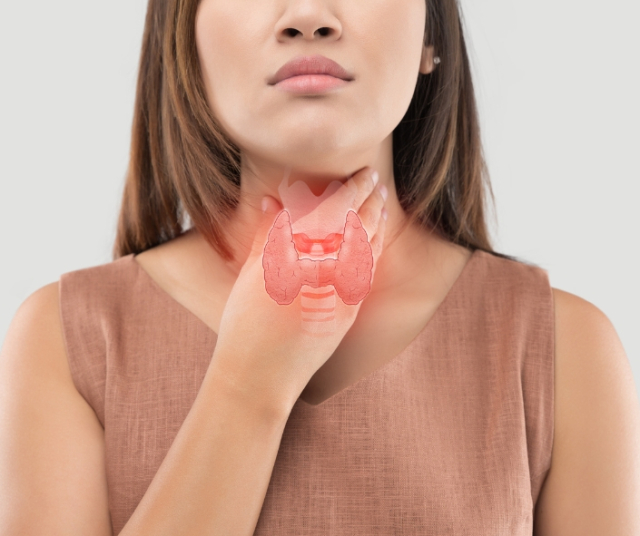Hypothyroidism is a medical condition that affects millions of people around the world. It is characterized by insufficient production of thyroid hormones by the thyroid gland, which can cause a wide range of symptoms and health problems. Despite its prevalence, hypothyroidism is still often misunderstood or overlooked.
What is hypothyroidism?
The thyroid gland is a small butterfly-shaped gland located in the front of the neck. Its main function is to produce thyroid hormones, which are vital for regulating the body's metabolism and maintaining energy balance. When the thyroid gland does not produce enough hormones, hypothyroidism occurs.
Hypothyroidism can be caused by a variety of factors, including autoimmune disorders, structural problems in the thyroid gland, nutritional deficiencies, radiation therapy to the neck area, and certain medications. Regardless of the cause, the result is a decrease in thyroid hormone production, which slows the body's metabolic functions.
Causes of Hypothyroidism
Autoimmune Disorders : Autoimmune thyroiditis, also known as Hashimoto's disease, is the most common cause of hypothyroidism in areas with sufficient iodine in the diet. In this disorder, the immune system attacks the thyroid gland, causing inflammation and long-term damage.
Thyroid Surgery: Some people may develop hypothyroidism as a result of thyroid surgery, especially if the thyroid gland is removed entirely.
Iodine Deficiency: Iodine is an essential component of thyroid hormones. Dietary iodine deficiency can lead to the development of hypothyroidism, especially in areas where iodine is scarce in the food and water supply.
Radiation therapy: Radiation therapy to the neck, often used in the treatment of head and neck cancer, can damage the thyroid gland and cause hypothyroidism.
Medications: Some medications, such as certain chemotherapy agents, lithium, and amiodarone, can interfere with thyroid function and cause hypothyroidism as a side effect.
Symptoms of Hypothyroidism
The symptoms of hypothyroidism can vary widely from person to person and can develop gradually over time. Some of the most common symptoms include:
Persistent fatigue and weakness: Extreme fatigue and feeling weak are common symptoms of hypothyroidism. People may experience a significant decrease in their energy and ability to perform daily activities, even after prolonged periods of rest.
Unexplained weight gain: Many people with hypothyroidism experience unexplained weight gain or have difficulty losing weight, despite following a healthy diet and exercising regularly. This is due to the slowing of metabolism that accompanies hypothyroidism.
Cold sensitivity: People with hypothyroidism often have difficulty tolerating the cold and may feel constantly frozen, even in environments with moderate temperatures. This is because hypothyroidism affects the body's ability to regulate temperature.
Constipation: Hypothyroidism can slow bowel movement, which can lead to chronic constipation. People may experience difficulty passing bowel movements regularly, which can cause abdominal discomfort and other digestive problems.
Dry skin and brittle hair: A lack of thyroid hormones can affect the skin's ability to retain moisture, which can lead to dryness, itching, and peeling. Additionally, hair can become dry, brittle and prone to loss.
Hair loss: Hypothyroidism can cause widespread hair loss throughout the scalp, as well as a decrease in the rate of hair growth. This can result in thinning hair and loss of volume.
Irregular or heavy menstruation in women: Women with hypothyroidism may experience changes in their menstrual cycle, which may include irregular periods, heavier or more painful periods, and difficulty conceiving.
Bradycardia (slow heart rate): Hypothyroidism can affect the heart rhythm, causing bradycardia, which is an abnormally slow heart rate. This can cause symptoms such as dizziness, fatigue, and fainting.
Depression and mood changes: Many people with hypothyroidism experience mood changes, including depression, anxiety, irritability, and lack of motivation. These symptoms may be the result of decreased brain activity associated with hypothyroidism.
Difficulty concentrating and memory loss: Hypothyroidism can affect cognitive function, resulting in difficulty concentrating, memory loss, and mental confusion. These symptoms can interfere with work, school, and other daily activities.
Swelling in the face and extremities: Fluid retention is common in people with hypothyroidism, which can cause swelling in the face, hands, feet, and other parts of the body. This swelling can contribute to feelings of discomfort and stiffness.
High cholesterol: Hypothyroidism can affect blood cholesterol levels, increasing the risk of developing cardiovascular diseases. Elevated levels of LDL cholesterol ("bad cholesterol") and triglycerides are common in people with untreated hypothyroidism.
It is important to note that not everyone with hypothyroidism will experience all of these symptoms, and the severity of symptoms can vary considerably.
Diagnosis of Hypothyroidism
The diagnosis of hypothyroidism is usually made through laboratory tests to evaluate the levels of thyroid hormones in the blood. The thyroid-stimulating hormone (TSH) test is the most commonly used initial test. If TSH levels are elevated and thyroid hormone levels (T3 and T4) are low, this suggests primary hypothyroidism.
In addition to lab tests, doctors may also perform a physical exam to look for physical signs of hypothyroidism, such as dry skin, brittle hair, and slow reflexes.
Hypothyroidism Treatment
The standard treatment for hypothyroidism involves the administration of synthetic thyroid hormone in the form of levothyroxine. This medication is taken once a day and is usually taken for life. The dose is adjusted individually depending on the levels of thyroid hormones in the blood and the patient's response to treatment.
It is important to closely monitor the treatment of hypothyroidism with periodic laboratory tests to ensure that thyroid hormone levels are within the normal range and adjust the levothyroxine dose as necessary. In addition to medication, it is essential to adopt a healthy lifestyle that includes a balanced diet, regular exercise, and stress management to optimize thyroid function and improve overall quality of life.
